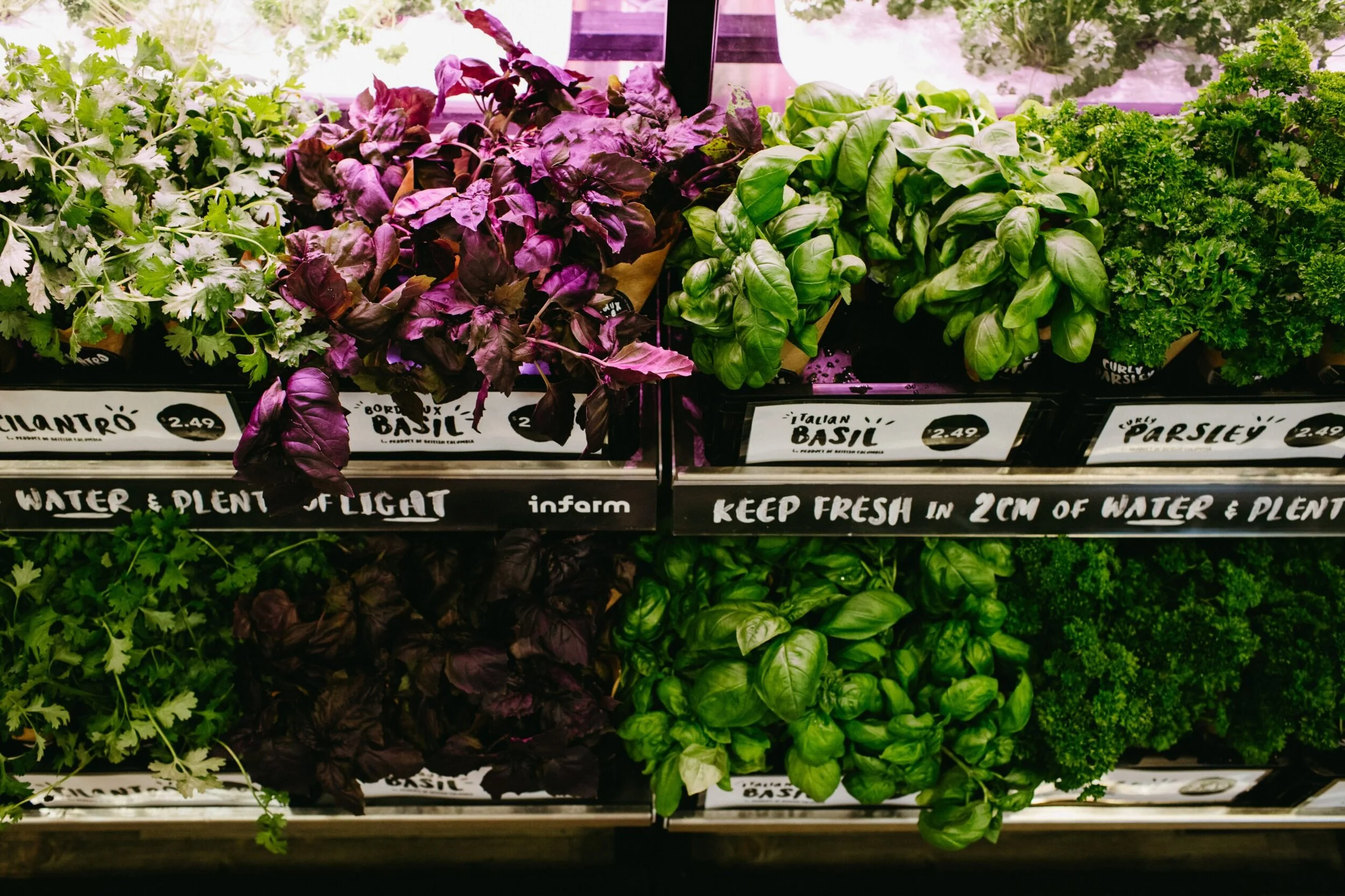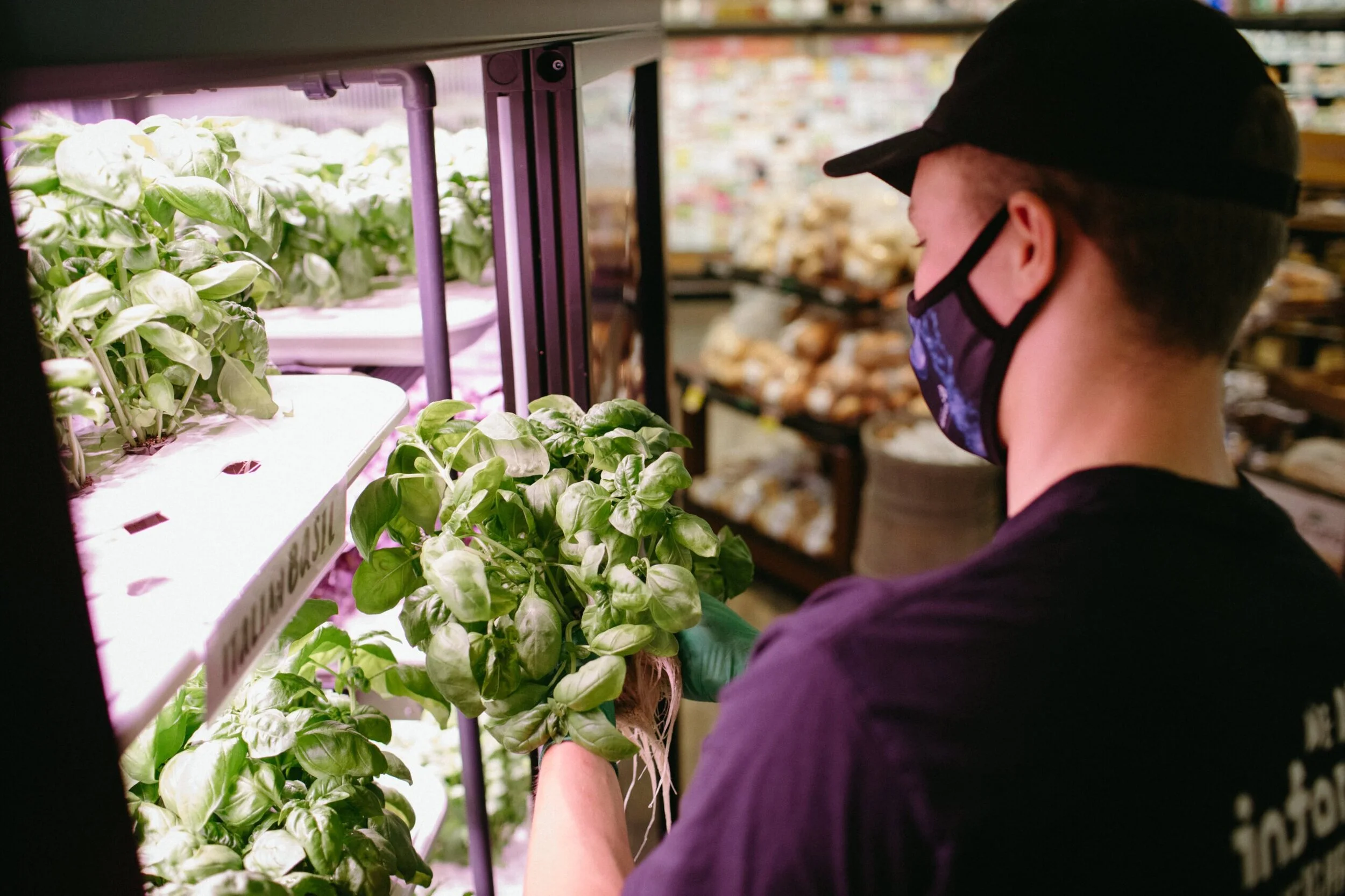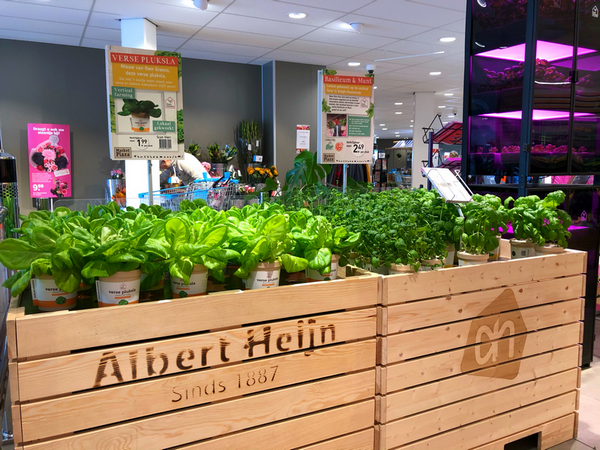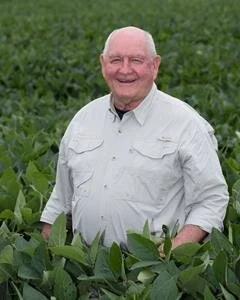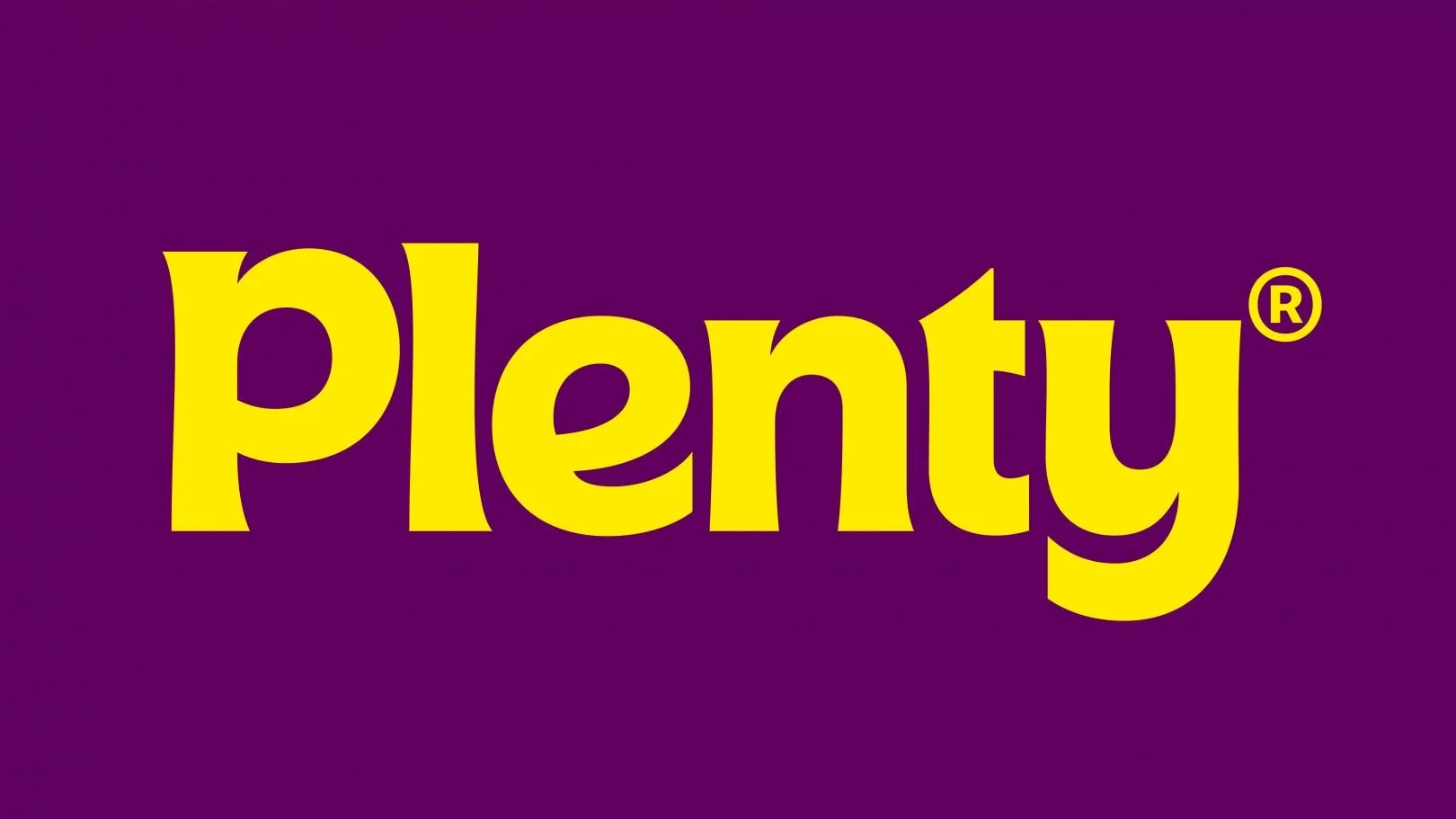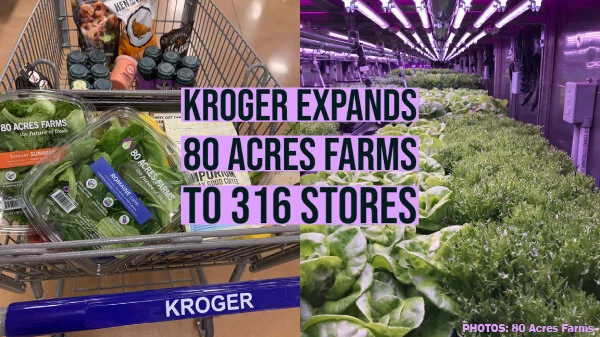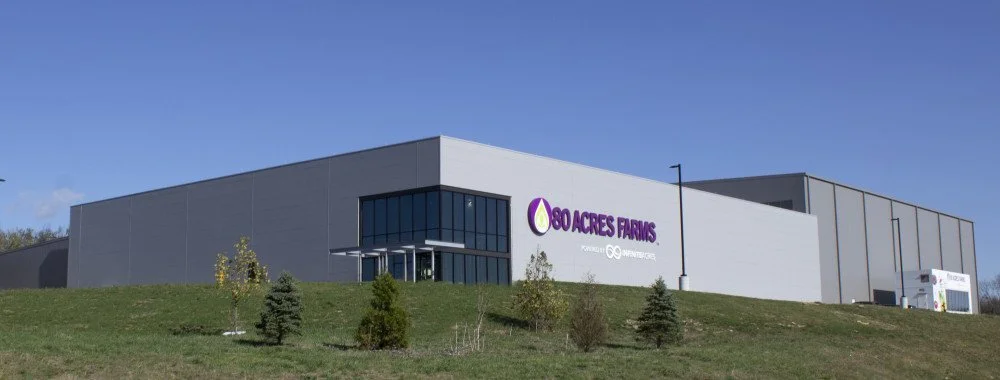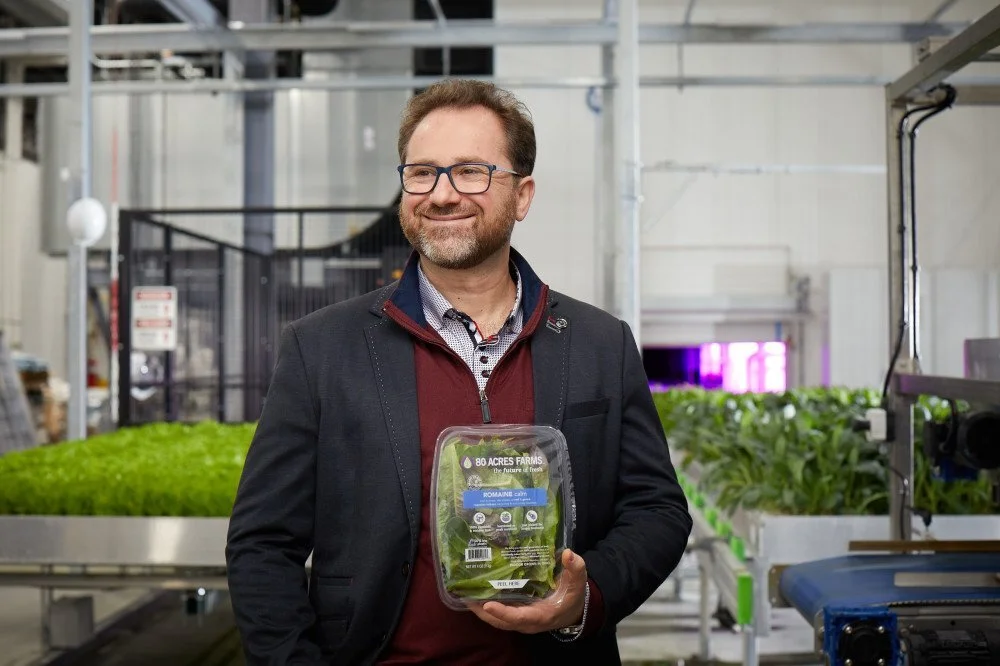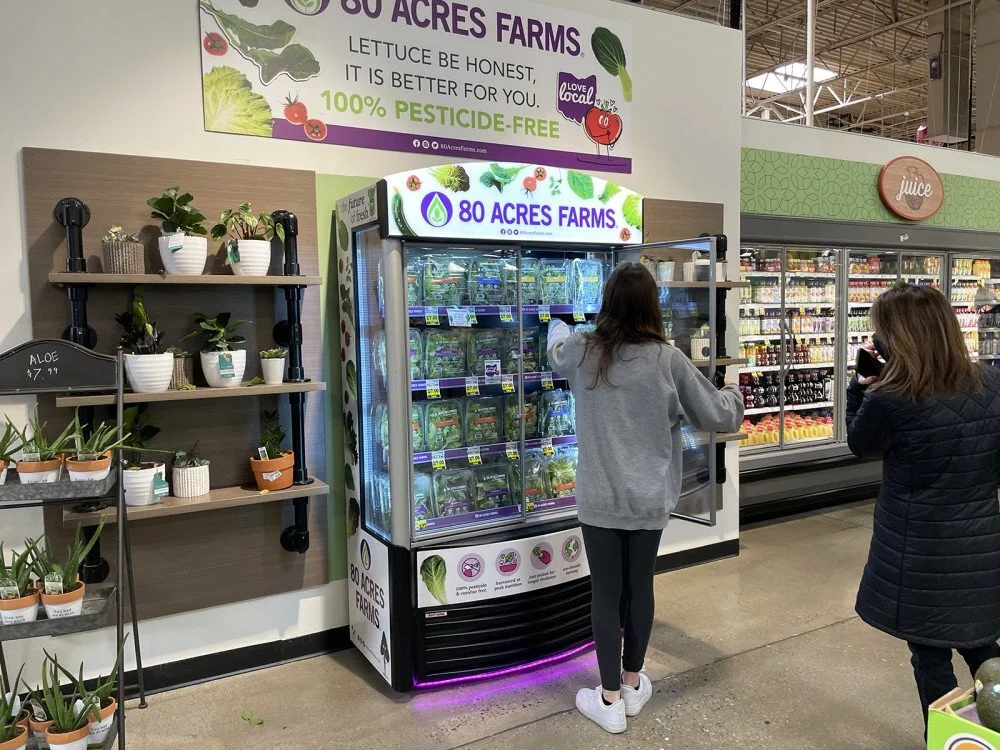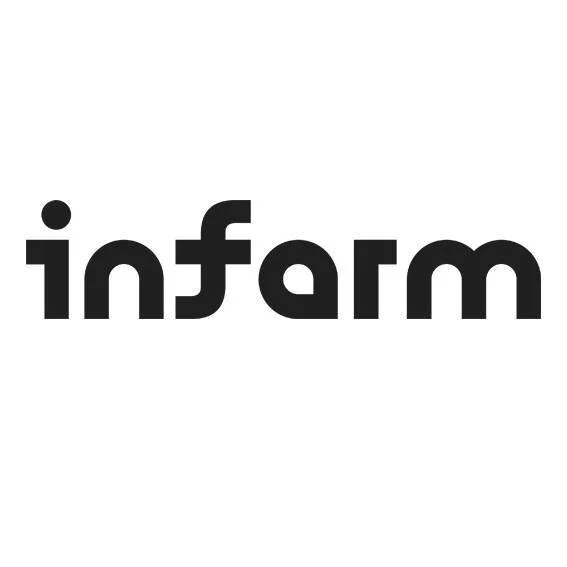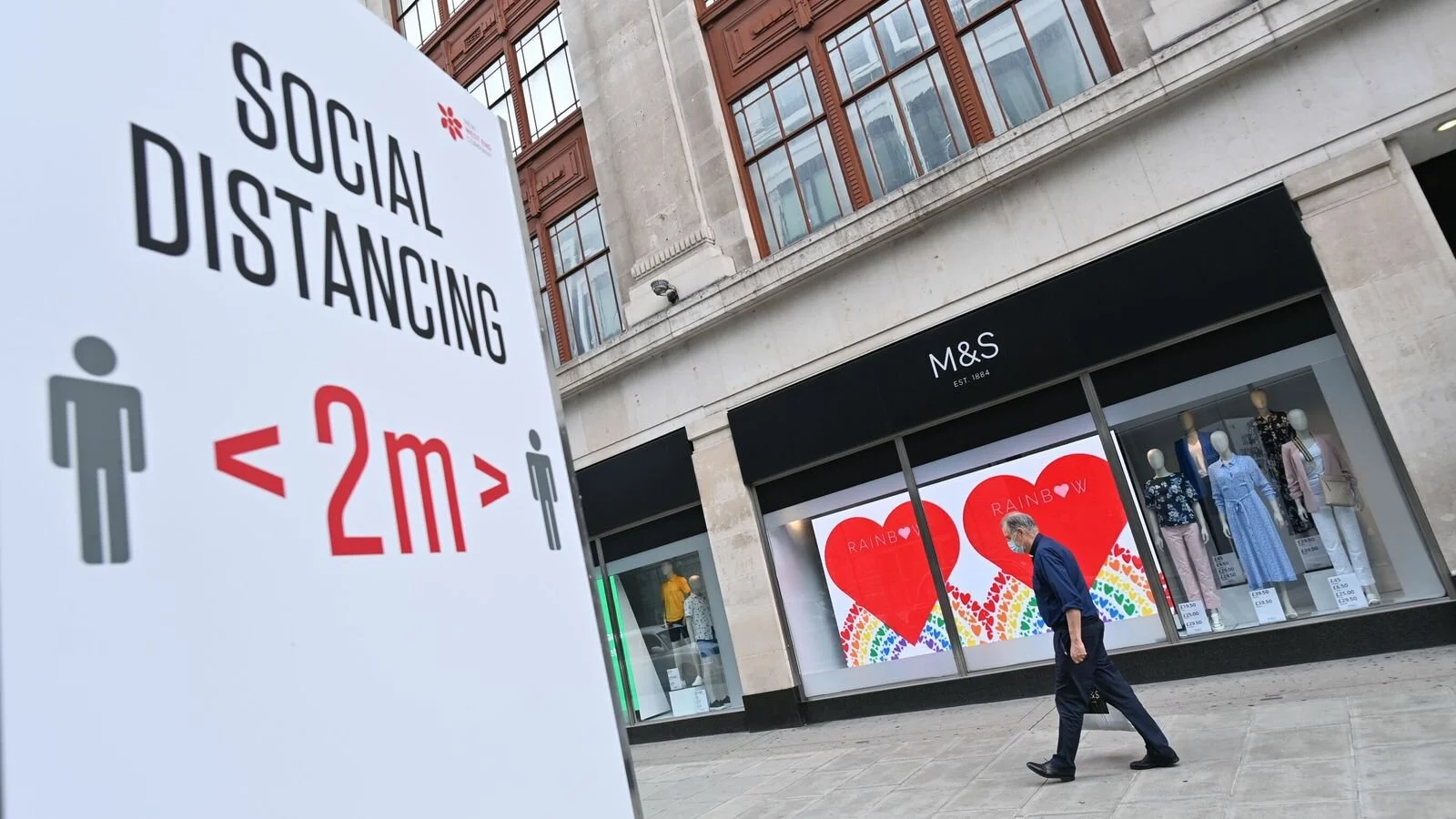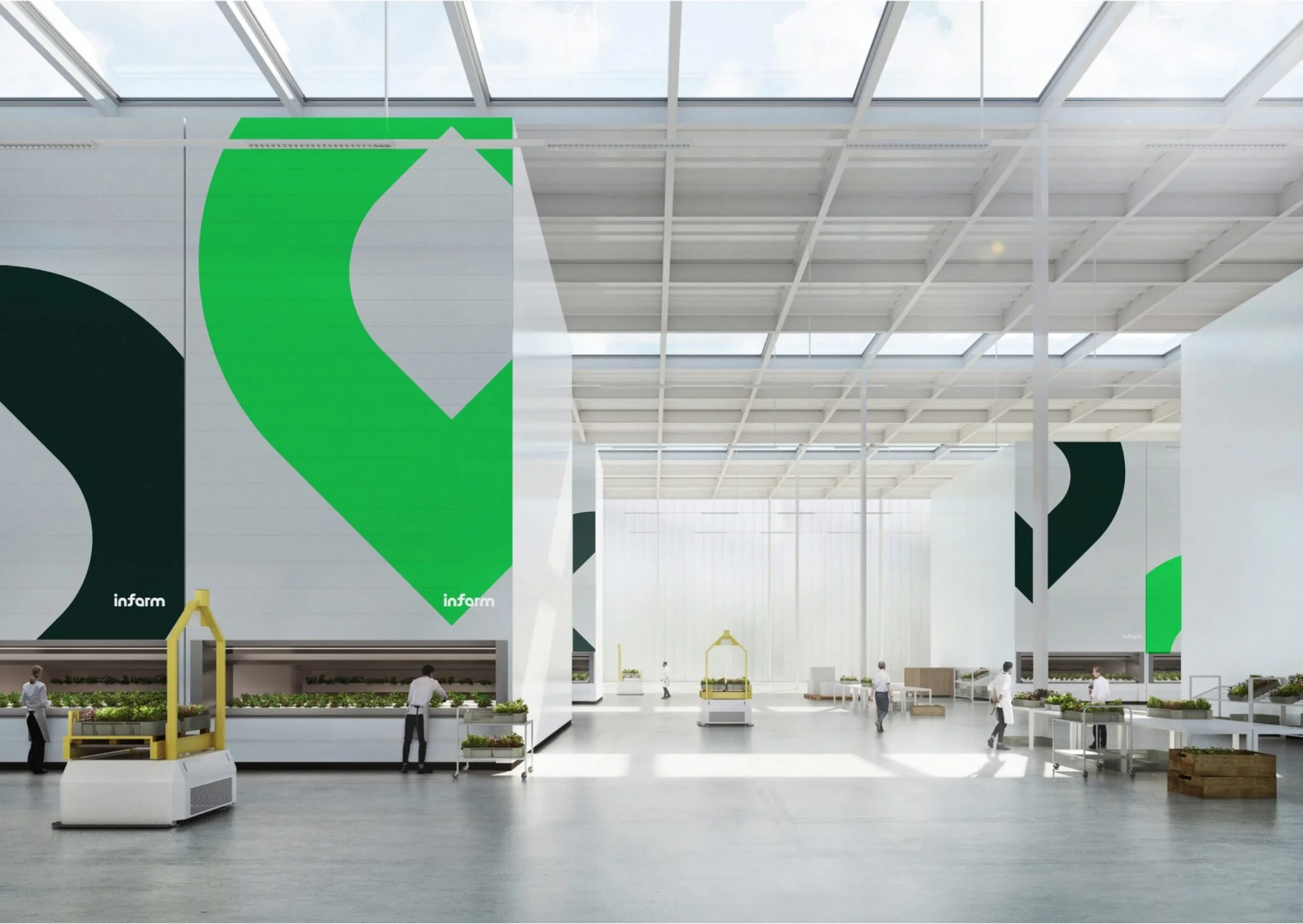
Welcome to iGrow News, Your Source for the World of Indoor Vertical Farming
Sobeys Expanding In-Store Vertical Farms Across Canada
Grocery store chain Sobeys is expanding its unique Infarm vertical farming units to more stores across the country as it takes advantage of the growing consumer appetite for made local products
May 2, 2021
Grocery store chain Sobeys is expanding its unique Infarm vertical farming units to more stores across the country as it takes advantage of the growing consumer appetite for made local products.
Niluka Kottegoda, Vice President Customer Experience, Sobeys, said Infarm is a vertical farming company based out of Germany.
Niluka Kottegoda
“We searched far and wide to find a really great best-in-the-world, unique, innovative solution for our customers as we were looking for a vertical farming solution,” she said.
“Infarm provided us with an opportunity to get farms into our stores, with end-to-end service. So they made it very easy for our stores and most importantly our customers’ best experience when it came to vertical farming globally. Each unit that you’ll see in the stores is a farm unto itself. The plants grow right in that module and they control all of the nutrients, the amount of water, the amount of food our plants get, and the amount of light that they get from a central farming platform.
“Just before COVID hit, I had the opportunity to go and see their office. And it’s really very special. On a screen, you can see every farm that they have around the world. They know exactly the condition of that plant and what it needs and if there’s a problem they can quality control. It’s all managed through the cloud and each one of the farmers has a tablet and information is passed on to the units and the farmers through their central platform.”
Local farmers manage the vertical farming at the individual grocery stores, where a variety of herbs, microgreens, leafy greens, and lettuces are grown year-round. Produce is grown directly in-store in a controlled energy-friendly environment and harvested sustainably.
Sobeys first unveiled its partnership with Infarm in 2020 and began its national rollout by unveiling Infarm vertical farming units in Safeway and Thrifty Foods stores in Vancouver and Victoria, B.C.
Kottegoda said generally there are two units per store but in larger stores, more units can be added.
“Right now we have them across Vancouver and Victoria. We have one installed in Halifax with 25 more coming. We have two installed in Calgary with 22 more coming. And one installed in Edmonton with 18 more coming,” she said.
“Once these latest ones are installed we’ll be closing in on 100 stores across the country. At the moment, we’re probably about 55 percent of the way there. We’re expanding across seven cities in the country.”
Kottegoda said the company does an assessment of all of its stores across the country to see whether it’s viable to put a farm into certain locations.
“The reason we’re going city by city is to make sure that we have the farmers ready. You just can’t put a unit in the store and hope for the best. You have tons of farmers there to support it. We have to make sure the local infrastructure is there and then we can expand across the country which is why you see us going city by city,” she added.
The company said these crops are harvested using 95 percent less water, 90 percent less transportation, and 75 percent less fertilizer than industrial agriculture.
“One of the great appeals of them is you can get fresh herbs, and leafy greens, all year round even through the winters as fresh as possible in our stores,” said Kottegoda.
“We can change up the assortment every five weeks. So the five-week cycle is from when our herbs and leafy greens and plants grow from seedlings until they’re ready to harvest. We can switch up the assortment anytime we need to. We can be really relevant to all of our local customers which is pretty exciting.”
She said locally-grown products are very important for consumers these days and the company has seen the importance of partnering with local producers in its stores.
“It’s also about the freshness and the taste experience. All of our customers are always looking for the best in terms of food and we pride ourselves in being able to give that to them. This is the freshest possible product, locally grown all year long,” added Kottegoda.
“And it’s been an interesting journey because we have been expanding during the pandemic and we have seen incredible trends in terms of at-home cooking, getting more and more popular. Going along with that people are getting more adventurous with the ingredients that they use, and the different herbs that they use.”
Lead photo: Exterior of Sobeys grocery store. Photo: Supermarket News
Article Author
Mario Toneguzzi, based in Calgary, has more than 40 years experience as a daily newspaper writer, columnist, and editor. He worked for 35 years at the Calgary Herald covering sports, crime, politics, health, faith, city and breaking news, and business. He now works on his own as a freelance writer and consultant in communications and media relations/training.
ITALY: Zero Farms Delivers Its Salads To Regional Supermarkets
This launch is proof that Zero farming is the solution to enable access to quality products for a wide range of consumers
After years of R&D by the company team, they're now aiming to create an ideal environment, combined with software and technologies for the aeroponically growing salads, arugula, aromatic herbs, and packaged microgreens. All crops are grown in a Pordenone-based production site. The formerly abandoned warehouse has a capacity of producing up to 30 tons per year.
"This launch is proof that Zero farming is the solution to enable access to quality products for a wide range of consumers." This is how Zero's CEO Daniele Modesto explains the entry into the Italian market. The company now presents its first products on the shelves of the Eurospesa supermarkets in Friuli Venezia Giulia and Veneto.
"We entered large-scale distribution starting with local groups, because we needed to take measures with some processes that were new to us. The processes had to be refined before going into national distribution groups," explains Daniele.
"It all started with a visit to the Expo Milano in 2015. What struck me most was a small glass cube that contained basil, arranged in multiple layers, illuminated by LED lights: the embryonic prototype of a vertical farm. From there on, I tracked down the designer and contacted him."
This appeared to be Paolo Battistel, one of Europe's greatest experts in soilless cultivation and today's scientific supervisor of Zero. He then told me what vertical farming comprised and that it would be a new frontier of agriculture. He said that it often clashes with the economic unsustainability of the project." Modesto then shared his idea with Andrea Alessio, owner of a company that deals with industrial photography with a strong passion for the product and the management of production processes."
In 2018, Zero was born in the Italian commune, Pordenone. Initially self-financed with the first partners, it later saw the first investments of other industrial companies in the area. At the beginning of 2021, the company entered the national and international agritech market as Zero Modular Architecture. This is a proprietary hardware-software technology to mass-produce, on an industrial scale, production plants in vertical farms. Namely, a transversal technological platform that involves the combination of standardized components, all produced independently by Zero, which is quickly assembled in disused industrial spaces regenerated into farms powered by clean energy.
Read more at Fruitbook Magazine (in Italian)
8 Apr 2021
Providing Farming Solutions At Every Customer Level
Currently, the company is running a pilot farm in Japan, in collaboration with Kaneya Co., LTD. Kaneya operates the farm, whereas Own Greens patented growing technology is used
“Since we’ve started the pilot farm in Japan, we’ve had several parties reaching out for large-scale projects throughout the country," says Lennart Bijl, Operation Manager at Own Greens. The Dutch-based company is currently finetuning farming techniques in order to create a concept that can be quickly rolled out throughout Japan, and later on worldwide.
"We’re focusing on promoting our Own Greens brand in the fresh produce market. Whereas we’re also currently expanding partnerships with market players,” Lennart adds.
Japan pilot
Currently, the company is running a pilot farm in Japan, in collaboration with Kaneya Co., LTD. Kaneya operates the farm, whereas Own Greens patented growing technology is used. The facility grows up to 300.000 crops per year, which is supplied to several local supermarkets in the area.
The growing facility in Japan
“Our large-scale solution is designed to produce large quantities of leafy greens and fresh herbs in the most efficient way possible. This unique technology makes full automation possible and ensures an ultra-clean growth chamber to prevent contamination in the system. Key terms in this concept are Safe, Simple and Scalable and multiple elements are patented by Own Greens.” The company provides solutions with a floor space of 1000-5000m2, with a cultivation area that consists of more than 5000m2.
Own Greens' products and services, can be divided into three divisions. Namely, large-scale farming projects, B2B growing chambers (PlantHome Pro) and Own Greens Home, a small grow-kit used by consumers. The Vitro Plus-owned company, works closely with Nijssen, Bever Innovations, KV techniek and Kaneya. These collaborations are focusing on three keystones, namely production, presentation and product.
Lennart Bijl checking the PlantHome Pro produce
Product testing
Own Greens has been piloting its products, at a local supermarket, Albert Heijn. “Initially we started the project to gain more awareness on vertical farming and its benefits, says Lennart. “We used flyers that visitors could take along, and our product packaging has a removable paper wrap around it which explains the production process of each product.”
As the project gained lots of attention from visitors, Own Greens is now supplying its vertically grown basil, mint and lettuce crops to the store. The living herbs and lettuce are sold on bamboo paper pots, which contain water to increase the shelf life. Customers can keep the products in their home outside the fridge for up to a month.
PlantHome indoor garden
The PlantHome can be installed in any space wanted. It’s just a case of plugging in and growing. Both the PlantHome Pro and regular PlantHome home-kit make use of separated containers that contain plugs or pads with seeds. The PlantHome Pro device has multiple layers and can grow up to 30 plants per layer. Whereas it doesn’t include automation and a climate system, the indoor farm is easy to use. The mineral- and plant capsules can easily be applied into the trays so the crops will intake all nutrients needed. Customers now include restaurants, day-care centers, and canteens.
For more information:
Lennart Bijl, manager of operations
Own Greens
lennart@owngreens.com
www.owngreens.com
Publication date: Tue 30 Mar 2021
Author: Rebekka Boekhout
© VerticalFarmDaily.com
PODCAST: Is This The Fastest-Growing Vertical Farming Business In The World?
Infarm’s global footprint has expanded rapidly in recent months. Its in-store units have been cropping up across the globe – including in Japan, one of the longest established and most developed indoor agriculture markets
March 11, 2021
Indoor agriculture is competitive. While there is so much whitespace for vertical farms and high-tech greenhouses to grow and sell produce regionally, those that are VC-backed seem to have been fighting for investor attention for years – with big announcements often lacking substance. So who is really leading the race?
When I returned from maternity leave in January, I reached out to my good friend Henry Gordon-Smith from urban ag consultancy Agritecture to find out what I’d missed and what sort of traction these highly-funded startups were really getting.
When thinking about which company was making the greatest strides, Henry highlighted Infarm – the Berlin-based vertical farming group with more than $300m in funding under its belt.
Infarm’s global footprint has expanded rapidly in recent months. Its in-store units have been cropping up across the globe – including in Japan, one of the longest established and most developed indoor agriculture markets. It’s also expanding into new crops, a welcome addition to the leafy green focus so many of its peers continue to have. And, since we recorded this podcast — yes that’s how fast they’re moving — they announced the roll-out of new modular ‘Growing Centers’ and added yet more funding.
So we decided to co-host an episode with Infarm’s two co-founders — and brothers — Guy and Erez Galonska, to dig into this growth.
Expect to hear about Infarm’s surprising commitment to sustainability; the focus on their core customer -the retailer; the expansion of their plant science team; and the evolution of their differentiated business model. Enjoy!
Lead photo: Image credit: Infarm
Sonny Perdue, Former US Secretary of Agriculture And Georgia Governor, Joins Kalera Board of Directors
Brings over 40 years of experience in agriculture
Brings Over 40 years of Experience In Agriculture
Kalera (Euronext Growth Oslo ticker KAL, Bloomberg: KSLLF), one of the fastest-growing and largest vertical farming companies in the world and a leader in plant science for producing high-quality produce in controlled environments, today announced that Sonny Perdue, former United States Secretary of Agriculture and Georgia Governor, will join its Board of Directors and has also personally invested in the company in the latest financing round. Perdue’s appointment to the Board follows the addition of Maria Sastre to the Board of Directors, as well as Kalera’s acquisition of Vindara Inc., the first company to develop seeds specifically for use in vertical farming environments.
Sonny Perdue served as the United States Secretary of Agriculture from 2017 to 2021, where he initiated USDA’s Ag Innovation Agenda. Prior to his time as Secretary of Agriculture, Sonny served as Governor of Georgia from 2003 to 2011 and a Georgia State Senator from 1991-2002. As a state senator, he was often praised for tackling issues when no one else had the courage to do so and for his ability to grasp the nuances of complex problems. Sonny was recognized as a leading authority on numerous issues including agriculture, transportation, education, emerging technologies and economic development.
“Kalera remains focused on being global leaders in all that we do, whether it be in technology, expansion, innovation, building an executive team, or having a world class Board of Directors,” said Daniel Malechuk, CEO of Kalera. “The addition of a global industry titan like Sonny Perdue is a testimony to this commitment and validation of Kalera’s role in defining how we feed the world for generations to come. We are humbled that Sonny has chosen to join us as a fully-active participant on our Board, and are excited about the unique perspective and insight he will provide through his experience as Secretary of Agriculture for the world’s leading agriculture and food producer.”
“Kalera is leading the pack in a booming vertical farming industry,” said Sonny Perdue. “Kalera is a perfect example of the power of American innovation, creativity, and entrepreneurship to develop different, better ways to grow and provide food at home and around the globe. Through my travels, I’ve had the opportunity to experience many intriguing ideas in food and agricultural innovation and technology. In my opinion, Kalera captures the intersection of technology and sustainable food production better than anything I have seen. That is why I am excited about the potential I see in Kalera to change the way we grow and consume our food.”
This news follows the Company’s recent acquisition of Vindara Inc., the first company to develop seeds specifically designed for use in vertical indoor farm environments as well as other controlled environment agriculture (CEA) farming methods. Kalera has realized rapid expansion into a number of new markets including Atlanta, Houston, Denver, Columbus, Seattle, and Hawaii. Kalera is the only controlled environment agriculture company with coast-to-coast facilities being constructed, offering grocers, restaurants, theme parks, airports and other businesses nationwide reliable access to locally grown clean, safe, nutritious, price-stable, long-lasting greens. Kalera uses a closed-loop irrigation system which enables its plants to grow while consuming 95% less water compared to field farming.
About Kalera
Kalera is a technology driven vertical farming company with unique growing methods combining optimized nutrients and light recipes, precise environmental controls, and clean room standards to produce safe, highly nutritious, pesticide-free, non-GMO vegetables with consistent high quality and longer shelf life year-round. The company’s high-yield, automated, data-driven hydroponic production facilities have been designed for rapid rollout with industry-leading payback times to grow vegetables faster, cleaner, at a lower cost, and with less environmental impact. To learn more visit www.Kalera.com.
Fruitbox 56 - Daniel Kats, InFarm
Despite its name, InFarm’s roots are very much in the market. In February 2021, the Berlin-based urban farming startup announced the creation of new growing centres to supply fresh produce to the likes of Edeka, Lidl and Kaufland
5th March 2021
The Urban Farming Startup's Head of Sales
Tells Fruitnet About The Next Stage of its Impressive Expansion
Despite its name, InFarm’s roots are very much in the market. In February 2021, the Berlin-based urban farming startup announced the creation of new growing centres to supply fresh produce to the likes of Edeka, Lidl, and Kaufland.
Starting in Germany and extending very soon to the UK, Netherlands, France, Switzerland, US, and Canada, the move represents a step-change in its operations, scaling up a business model that until now has focused on smaller, plug-and-grow units within retail stores themselves.
Now, as demand for locally grown produce continues to rise, the company is preparing go beyond the 1,500 in-store farms already installed and ramp up production wherever the market demands it.
And with total venture capital funding of more than US$400m to date, it’s certainly shaping up to be one of the world’s most hotly tipped vertical growing startups.
“We are not building farms,” explains InFarm’s vice-president of corporate sales Daniel Kats, speaking on the latest episode of Fruitbox. “We’re taking facilities and deploying models inside. Those automated towers can then grow by demand. If the retailer has more demand, we just add one or two or ten more towers.”
Why now? “The population is growing, the demand keeps growing, and a lot of food production is needed in many large cities,” says Kats. “Therefore we are pushing the button now and starting to grow.”
Now operating in ten countries, and set to launch in Japan this year, the company is also venturing into new products. As a result, it’s ready to become a major supplier in its own right, rather than simply enabling retailers to grow a limited number of items in stores.
“We are growing much more variety and assortment,” Kats adds. “We started with a lot of leafy greens, herbs, lettuces, mixed salads, microgreens, and now we’re doing the first steps into tomatoes, mushrooms, chillies, strawberries in the future, which require naturally much bigger spaces to grow centrally and distribute to the supermarkets.”
Hosted by Chris White in London, Fruitbox now attracts a big audience across the global fruit and vegetable business that tunes in every week to hear exclusive interviews and expert analysis. Produced by Fruitnet Media International, the show is essential listening for everyone in the fresh produce industry.
All previous episodes of Fruitbox can be found on any of the following podcast services:
Apple · Spotify · Anchor · Google · Overcast · Soundcloud · Stitcher · Pocket Casts
Produced by Fruitnet Media International, the show is essential listening for everyone in the fresh produce industry.
To find out how you can tell your story on Fruitbox, email: chris@fruitnet.com
To learn about sponsorship and advertising opportunities, email: advertising@fruitnet.com
Enjoyed this free article from Eurofruit Magazine and its team of editors? Don't miss out on even more in-depth analysis, plus all the latest news from the fresh produce business. Subscribe now to Eurofruit Magazine.
VIDEO: Plenty Expands In Safeway Stores Across Northern California
Vertical Farming Leader Debuts Text-a-Farmer Feature at Point-of-Sale, Allowing Shoppers to Ask a Plenty Farmer Direct Questions
March 9, 2021
Vertical Farming Leader Debuts Text-a-Farmer Feature at Point-of-Sale, Allowing Shoppers to Ask a Plenty Farmer Direct Questions
SOUTH SAN FRANCISCO, Calif., March 9, 2021 – Plenty, the flavor-first vertical farming company with a mission to improve the lives of people, plants, and the planet, today announced an expansion to 17 new Safeway stores across Northern California, bringing the total number of stores carrying Plenty produce in the region to 53.
The additional Albertsons-owned stores, which include Safeway and Vons, are part of the multi-year agreement between the two companies to expand Plenty produce into over 430 Albertsons-owned stores across the state of California.
The new store locations are primarily in smaller communities, making Plenty the first indoor, vertically farmed produce available to these shoppers.
Plenty is also employing a first-of-its-kind Text-a-Farmer feature, on display next to its greens in-store. Text-a-Farmer lets shoppers text questions while shopping and receive an answer directly from a Plenty farmer.
Questions can cover anything related to Plenty and its produce, including “do you use pesticides on your leafy greens,” “is your packaging recyclable,” or “how do I keep my greens fresh for longer?”
In the age of COVID when human contact has been limited, and in-person sampling is restricted, Plenty is working to connect with shoppers directly to answer questions and share information.
“At Plenty, we’re proud of the fresh, flavorful greens we grow in our farm, and of our transparent growing process, which lets us track a plant from seed to kitchen,” said Nate Storey, co-founder and chief science officer at Plenty. “The Text-a-Farmer program is one way we can directly connect with customers and hear their personal questions and experiences. We’re always excited to engage with shoppers and help them learn more about our company and the delicious produce we grow.”
Plenty’s sustainable farm delivers produce year-round that tastes like it was picked fresh from the garden. Using data analytics, machine learning and customized lighting, Plenty is able to coax the natural flavors and nutrients from the plants, creating a superior taste experience from leafy greens.
Operating on vertical towers, the farm grows hundreds of acres in a space the size of a big box store, using a fraction of the land and water used in outdoor growing.
All store locations carry four of Plenty’s flavor-first products:
• Baby Arugula – A bold baby arugula with seductive spice and subtle hints of summer citrus and black pepper
• Baby Kale – A velvety-soft baby kale highlighted by bright notes and a smooth finish
• Crispy Lettuce – A crispy leaf delivering the fresh, clean crunch you crave and versatility deserving of your most creative ideas
• Mizuna Mix – A crunchy, colorful mix of tatsoi and mizuna that brings a mustardy heat to the table
A full list of Plenty stores across the Bay area can be found here.
About Plenty
Plenty is an American farming technology company that frees agriculture from the constraints of land, weather, seasons, time, distance, pests, natural disasters, and climate. The company’s plant scientists, engineers, and farmers have developed its indoor vertical farming technology to grow nutrient-rich and pesticide-free plants with extraordinary flavor. The Plenty platform is designed to grow multiple crops in a building the size of a retail box store, yielding hundreds of acres using a fraction of the water and other precious resources. Plenty’s flagship farm and headquarters are located in South San Francisco, and the company operates the largest of its kind Research and Development farm in Laramie, Wyoming. Plenty is currently building the world’s highest-output, a vertical indoor farm in Compton, California.
Tagged greenhouse, plenty
Related Posts
AmplifiedAg offers indoor farm platform, eyes rapid expansion March 4, 2021 Press Release
Gotham Greens expansion hits West Coast March 4, 2021 Press Release
Kroger Expands Partnership With 80 Acres Farms To 316 Stores
80 Acres Farms latest farm in Hamilton, OH grows10 million servings of fresh, pesticide-free produce annually
80 Acres Farms latest farm in Hamilton, OH grows10 million servings of fresh, pesticide-free produce annually
CINCINNATI - March 8, 2021 - ( Newswire.com )
The Kroger Co. (NYSE: KR) and 80 Acres Farms bring farm-fresh produce to customers across Ohio. Today, the companies are growing their partnership to reach more shoppers in the Midwest - both in-store and online.
“Everyone deserves easy access to fresh, affordable, delicious food,” said Dan De La Rosa, Group Vice President Fresh Merchandising, Kroger. “This newly expanded partnership means more communities will have just-picked produce at their fingertips 365 days a year. We’re proud to partner with 80 Acres Farms as we work together to create a world with Zero Hunger | Zero Waste.”
80 Acres Farms’ breakthrough technology means the company can grow pesticide-free produce all year long. With locations closer to customers, the farm-to-table carbon footprint and overall food waste are low.
“Kroger leads with their commitment to fresh by providing customers access to fresher and more nutritious produce,” said Mike Zelkind, CEO and Co-founder of 80 Acres Farms. “Consumers are looking for more nutrition from their diet and want to trust that their food is safe and chemical-free and it will last longer in their refrigerators. The 80 Acres Farms brand delivers against all those promises.”
Today, 80 Acres Farms has four locations in Greater Cincinnati. Its latest state-of-the-art farm will support the new Kroger partnership, bringing 10 million fresh produce servings to communities across the Midwest.
Beginning March 15, 80 Acres will serve 316 Kroger locations across Ohio, Indiana, and Kentucky.
For further information, please contact us at:
Rebecca Haders
rebecca.haders@eafarms.com / +1 513-910-9089
Related Links
New funding sets up 80 Acres Farms for ‘rapid’ expansion
‘The future of food’: 80 Acres debuts world’s first-of-its-kind indoor farm: PHOTOS
Press Release Service by Newswire.com
Original Source: Kroger Expands Partnership With 80 Acres Farms to 316 Stores
Urban Agriculture Giant Infarm To Reap $250m From Next Fundraising
The company, which has a partnership with Marks & Spencer, is working with Goldman Sachs, Sky News learns
The Company, Which Has A Partnership
With Marks & Spencer,
Is Working With Goldman Sachs, Sky News Learns
Infarm says it is the fastest-growing urban farming firm with interests including 'cloud-connected growing centres'.
Infarm, one of the world’s fastest-growing vertical farming companies, has picked bankers to line up a mammoth fundraising that will underline burgeoning investor interest in the sector.
Sky News has learnt that Infarm has hired Goldman Sachs to oversee its biggest funding round to date, just five months after raising $170m from a syndicate of blue-chip backers.
Sources said the latest financing was likely to kick off in the coming weeks and would be completed later this year.
Infarm has a partnership with M&S
It is expected to crystallize the so-called 'unicorn' status for Infarm - meaning it would join the crop of European technology companies worth at least $1bn.
Infarm, which is based in Germany, is targeting a vertical farming network of 5m square feet by 2025, it said in a statement last year.
The company is one of a breed of start-ups attempting to address food supply problems, some of which have become particularly intense during the coronavirus pandemic.
Unlike its rivals, Infarm installs modular 'mini-farms which are located within supermarkets and restaurants.
Swegreen’s New In-Store Farming Service Will Be Scandinavia’s Biggest
Swegreen's innovative in-store service will make the Ica Maxi megamarket in Linköping, located in Mid-Sweden, the first of all Sweden’s megamarkets to offer fresh herbs and salad grown from seed to finished plant inside the store
March 01, 2021
Swegreen’s board member Pierre Mohlin meets up with Milleriine Axelsson who will be responsible for the in-store growing unit from Ica Maxi’s side.
Swegreen launches ‘NextGen’ of super-efficient in-store vertical farming service when Ica Maxi megastore in Linköping puts the company’s Farming-as-a-Service growing unit for leafy greens right at the entrance of the store. The new vertical farm will be Scandinavia’s largest in-store cultivation.
Swegreen's innovative in-store service will make the Ica Maxi megamarket in Linköping, located in Mid-Sweden, the first of all Sweden’s megamarkets to offer fresh herbs and salad grown from seed to finished plant inside the store. Every day, several hundred fresh leafy vegetables can be harvested for the store's customers.
- It won’t get more locally produced than this, says Ica Maxi Linköping's CEO Tomas Lundvall.
The actual cultivation facility, which takes place in the middle of the store entrance, will have glass walls from floor to ceiling. This, together with an eye-catching light from the plants' LED system, will leave a clear mark on the entrance to the store when the installation is ready later this spring.
- We have chosen a central place for cultivation to really clarify our commitment to a greener and more climate-smart food production. The cultivation will be a destination in itself for our customers, and once they get the opportunity to taste these crops, many will understand what fantastic quality such a cultivation system offers, says Tomas Lundvall CEO and owner of the megamarket.
- Our salad and our herbs will simply be the smartest greens in town, he adds.
The new in-store plant is based on hydroponic cultivation technology. Nutrition comes directly from the water, which can be recycled. The system can also recover energy, carbon dioxide and nutrients. Behind the innovation is the all-Swedish technology company Swegreen, which has developed both the cultivation room itself and the AI-based control system which, via a cloud service, controls and optimizes the environment in the cultivation.
- We are very proud to work with the team for Ica Maxi in Linköping for this installation, their commitment to hyper-local and climate-smart produced food shows that this is a megastore at the forefront, says Swegreen's CEO Andreas Dahlin.
- Ordinary vegetables sold in Swedish supermarkets have traveled an average of 3,000 kilometers, while these crops have not been transported at all. Of course, it gives better taste, better consistency and durability - and also better nutritional value, he continues.
The new in-store service will start delivering leafy greens in May, and it will then be able to supply the megastore with different kinds of herbs such as coriander, dill, and parsley, and also lettuce and cabbage. The crops will also be used for in-house production in the store's own kitchen, and in future, there will be the possibility of more types of vegetables.
Swegreen is an all-Swedish ESG AgTech company combining advanced technology with data and plant science to efficient produce high quality and climate smart leafy greens in urban environment. Swegreen offers a prescription based growing service called Farming-as-a-Service (FaaS). With it, any supermarket or restaurant owner can supply their customers with fresh, nutritious, well-tasting and hyper-locally produced leafy greens all year. See more at www.swegreen.com
ICA Maxi Stormarknad Linköping was established in 1993 as one of the ICA Groups first Maxi megamarkets in Sweden. It’s the largest of its kind in the region and one of the largest ICA-stores all categories. The total sales area is 8,000 sqm and it employs around 300 persons. See more at: www.ica.se/butiker/maxi/linkoping/maxi-ica-stormarknad-linkoping-8900/start/
Infarm Heralds The Next Generation of Cloud-Enabled Farming
Infarm Heralds The Next Generation of Cloud-Enabled Farming
Infarm introduces its new high-capacity, cloud-connected Growing Centers - a major step in the company's efforts to accelerate the benefits to people and planet by building a scalable, sustainable and resilient global farming network
NEWS PROVIDED BY Infarm
Feb 23, 2021
Berlin, Germany -- February 23, 2021, Infarm, the world's fastest-growing urban farming company already available in 10 countries and 30 cities in thousands of stores, continued the rollout of its vision for a global interconnected, sustainable, and highly efficient farming ecosystem.
©Infarm
Infarm, the world’s fastest-growing urban farming company, has introduced its new high-capacity, automated, modular Growing Center - a local farm and distribution center in one, that can generate the crop-equivalent of up to 10,000 m2 of farmland, with up to 400 times higher efficient food production than soil-based agriculture. The cloud-connected, high-yield centers join Infarm’s expanding global network of self-learning farms that improve plant yield, taste, and nutritional value while reducing the use of natural resources. Credit: Infarm/diephotodesigner.de (PRNewsfoto/Infarm)
As part of its goal to drive innovation within the USD 3 trillion global fruit and vegetable market[1], Infarm today introduced its new high-capacity, automated, modular Growing Center - a local farm and distribution center in one, that can generate the crop-equivalent of up to 10,000 m2 of farmland, with up to 400 times higher efficient food production than soil-based agriculture.
The cloud-connected, high-yield growing centers join Infarm's expanding global network of self-learning farms that improve plant yield, taste, and nutritional value constantly, while further reducing the use of natural resources. With 50,000 m2 of farming facilities and hundreds of farms in store locations, Infarm is already providing fresh produce to 50% of the world's largest food retailers. The rapid deployment capability of the new high-yield Growing Centers will drive additional global growth and scalability to match the needs of retailers of any size in any location, with the goal of growing the network to 500,000 m2 by 2025.
A Growing Center is comprised of dozens of modular farming units, each standing between 10 and 18 meters high, occupying a 25 m2 ground footprint and requiring just six weeks to build, yielding the crop-equivalent of 10,000 m2 of farmland. This modular, data-driven, and distributed approach -- a combination of big data, IoT, and cloud analytics, in addition to rapid growth at a global scale -- sets Infarm apart from any other farming solution.
"Access to fresh, local, and sustainable food is a growing challenge, as people shift towards cities and climate change accelerates," explains Erez Galonska, co-founder and CEO of Infarm. "Today we're adding speed to scale with new technology that allows us to deploy a Growing Center to any city in the world in a fraction of the time, space and capital investment of most large-scale farming solutions today. Both the farms and the software that powers them were designed to make fresh food more accessible for everyone, everywhere."
Many of the world's leading food retailers are already taking part in Infarm's farming network, including Empire Company Ltd (Safeway, Sobeys, ThriftyFoods), Whole Foods Markets, Marks & Spencer, Kroger, Kinokuniya, Aldi, Amazon, Auchan, Casino, E.Leclerc, Edeka, Intermarché, Irma, Kaufland, Metro, Migros, Selgros, Summit and in Germany, Canada, Denmark, France, Japan, Luxembourg, the Netherlands, the United Kingdom, the United States and Switzerland.
Growing a new food system for people and the planet
"The entire Infarm network is connected to a central farming brain that gathers more than 50,000 growth, color, and spectral data points through a plant's lifetime," explains Guy Galonska, co-founder and Chief Technology Officer at Infarm. "We've collected more than 300 billion data points throughout our farming network to date. These data enable us to perfect our growing recipes and improve yield, quality, and nutritional value while reducing the production price constantly."
The large-scale Infarm Growing Centers integrate farming units that can each save up to 10,000,000 liters of water per year, compared to soil-based agriculture for similar crops, while contributing up to 40% energy savings over previous Infarm technologies.
By 2025 Infarm plans to establish 100 Growing Centers - equivalent to 1.5 million m2 of farmland and producing 450,000,000 plants across its network, including expanding to new markets. This year, 15 Infarm Growing Centers are already planned/or under construction in major urban centers, including London, Paris, Copenhagen, Toronto, Vancouver, Seattle and Tokyo.
Additional features of the new Infarm technology:
An automated mechanical farming system that is cloud controlled;
Environmental settings like CO2, temperature, light, pH and growth cycles can be set, monitored, analyzed online across all farms;
Recirculates 20 liters of water condensation per hour and, saving more than up to 10,000,000 liters of water per year compared to soil-based agriculture for similar crops;
Smart LED management supports energy efficiency offering contributes up to 40% energy savings & up to 25% savings on initial investment.
Infarm uses 95% less water, 90% less transport and zero chemical pesticide than soil-based agriculture with the majority of electricity use throughout the Infarm network coming from renewable energy. To date, the Infarm network has saved more than 40,000,000 liters of water and 50,000 square meters of land.
[1] Wyman, O. (2021). Disruption in fruit and vegetable distribution - Fruit Logistica Trend Report 2018 [Ebook] (p. 12). Berlin, Germany: Fruit Logistica, Messe Berlin GmbH. Retrieved from https://www.oliverwyman.com/content/dam/oliver-wyman/v2-de/publications/2018/Feb/Fruit_Logistica_Trend_Report_2018.pdf
About Infarm
Infarm was founded in Berlin in 2013 by Osnat Michaeli and the brothers Erez and Guy Galonska. Passionate to become self-sufficient and eat better, they were growing their own food, enjoying all the flavor and nutrients, without the chemical pesticides and transport kilometers. With the aim to share the goodness of own-grown produce with everyone, they developed a smart modular farming system, that allows distribution of farms throughout the urban environment, growing fresh produce in any available space and fulfilling any market demand. Today, with cutting edge R&D, patented technologies, and a leading multi-disciplinary team, Infarm is growing a worldwide farming network helping cities become self-sufficient in their food production, while significantly improving the safety, quality, and environmental footprint of our food.
With a multinational team of more than 800 people globally, Infarm has partnered with more than 30 major food retailers including Aldi Süd, Amazon Fresh, Auchan, Casino, E.Leclerc, Edeka, Empire Company Ltd (Safeway, Sobeys, ThriftyFoods), Farmdrop, Intermarché, Irma, Kaufland, Kinokuniya, Kroger, Marks & Spencer, Metro, Migros, Selfridges, Selgros, Summit and Whole Foods Market in Canada, Denmark, France, Germany, Japan, Luxembourg, the Netherlands, the United Kingdom, the United States and Switzerland, deployed more than 1200 farms in stores and distribution centres, saved more than 40,000,000 liters of water and 50,000 square meters of land.
Photo - https://mma.prnewswire.com/media/1442283/Infarm.jpg
SOURCE Infarm
Also from this source
Whole Foods Market partners with Infarm to offer a more...
Is Controlled Environment Agriculture Addressing The Issues Facing The Agriculture Industry?
As chairman of the USDA Fruit and Vegetable Industry Advisory Committee, Paul Lightfoot at BrightFarms is looking for ways to make major improvements in food production, sustainability and consumption
BrightFarms founder and president Paul Lightfoot, who is chairman of the USDA Fruit and Vegetable Industry Advisory Committee, said controlled environment agriculture could play a major role in helping to solve some of the significant issues facing the ag industry and U.S. Photos courtesy of BrightFarms
As chairman of the USDA Fruit and Vegetable Industry Advisory Committee, Paul Lightfoot at BrightFarms is looking for ways to make major improvements in food production, sustainability, and consumption.
When Paul Lightfoot founded BrightFarms in January 2011 he had no experience in commercial food production. Ten years later he is president of one of the fastest-growing controlled environment agriculture companies in the United States. Starting with one 54,000-square-foot greenhouse facility in Pennsylvania in 2013, BrightFarms has expanded with greenhouse operations in four states with a total production area of 700,000 square feet.
“I had a background in retail supply chain improvement,” Lightfoot said. “I was running a supply-side software company for about nine years and was thinking about whether I could create an opportunity that would combine my career with my personal interest in healthy sustainable food. I studied different opportunities and came across the leafy greens supply chain as one that was ripe for destruction.
“At the time, all salads in North America basically came from the West Coast, either Salinas, Calif., in the summer or Yuma, Ariz., in the winter. I identified a very centralized, very industrialized supply chain that wasn’t benefitting consumers.”
Paul Lightfoot said an increasing amount of growth in the leafy greens market is coming from controlled environment agriculture.
Lightfoot said the concentrated field production locations and long-distance shipping required to deliver leafy greens to East Coast markets was not good for the product.
“Most leafy greens are five to seven days old when they arrive at retailers’ distribution centers, and that shows in the quality, nutrition, and taste,” he said. “I also thought field food production had some Achilles heals’ in terms of food safety and sustainability, which I thought would become more important, providing BrightFarms with a terrific market opportunity.
“I knew that consumers would continue to focus on healthy eating and that the demand for salads was going to rise. I grew confident that BrightFarms could disrupt a supply chain that was fragile and vulnerable.”
After opening its first greenhouse facility in 2013, Lightfoot said by the end of 2014 the company had figured out its operating model.
“We began to raise serious capital,” he said. “We graduated from venture capital to private equity in 2016 as we hit the national stage. We opened much larger greenhouses, one in Virginia to serve the Washington, D.C., market and one in Illinois to serve the Chicago and Milwaukee markets. Those were in partnership with Ahold Delhaize and Kroger.
“Before then I don’t think the produce industry had taken controlled environment salad production seriously. After 2016 we established ourselves as a contender to continue winning market share.”
Lightfoot said just about every major retailer in the U.S. now has an indoor-grown salad program on its shelves.
“There are billions of dollars of market share to be captured with leafy greens,” he said. “It’s a big and growing segment and by far the lion’s share of the growth is coming from controlled environment local production like ours.”
Helping to solve ag industry, societal issues
In October 2020 Lightfoot was elected chair of the USDA’s Fruit & Vegetable Industry Advisory Committee (FVIAC). Formed in 2001, the purpose of the committee is to examine issues that impact the fruit and vegetable industry and to provide recommendations and ideas to the Secretary of Agriculture on how the USDA can tailor programs to better meet the needs of the produce industry. FVIAC currently has four working groups: food safety, production, labor and trade.
“During our committee meetings the members develop a series of recommendations on the matters that are within the preview of the USDA,” Lightfoot said. “These recommendations are relevant to fruit and vegetable companies in the U.S., including growers, shippers, distributors, retailers and other organizations that have a stake in this space.”
Controlled environment vegetable production could be instrumental in providing consumers with healthier, more nutritious, better-tasting produce that is locally grown.
Lightfoot said the U.S. agriculture industry has an opportunity to help tackle some of the most pressing issues facing the U.S., including climate change and nutrition.
“We have a society where the majority of Americans are obese or nearly obese and an extremely high percentage is diabetic or pre-diabetic,” he said. “The leading cause of death in the U.S. is from chronic diseases that are a result of our diets.
“We don’t need fancy technology to see the solution. Only about one in 10 Americans eat the recommended servings of fruits and vegetables. Shifting our diets away from highly processed foods and toward more fruits and vegetables would reduce diet-related chronic diseases, reduce the costs of healthcare, and even improve our military readiness.”
Another area where Lightfoot said the agricultural industry could help resolve issues is related to climate change.
“It is well understood that the energy and transportation sectors are huge contributors to climate change,” he said. “In general, as a world, we are making progress on those fronts. I’m not alone in driving an electric car and powering my home with wind-powered electricity.
“Less well understood is that the U.S. agriculture industry emits 10 percent of our country’s greenhouse gases. It is also one of the most vulnerable sectors to more volatile weather that results from climate change.”
Lightfoot is particularly concerned about the impact the agriculture industry is having on the country’s top soil and water resources.
“We’re mining our soil,” he said. “If we continue to degrade our soils, we only have about 50 seasons of soil left in the Midwest. Farming practices in the Midwest and California have also had a major impact on waterways, reducing sources of potable water.
Paul Lightfoot said just about every major retailer in the U.S. now has an indoor-grown salad program on its shelves.
“More biodiversity needs to be introduced into the areas of the West Coast that currently grow our salads. It has become a monoculture, which has removed the life from the soil and disrupted the water cycles. One idea would be to provide incentives to those farmers to “re-wild” some of that land, adding biodiversity to restore the soils and water cycles. That lost production capacity could be offset with the growth in high intensity indoor farms.”
Taking the CEA industry seriously
Lightfoot said his participation with FVIAC is beneficial to BrightFarms and to the CEA industry.
“It is important to remember that I am representing the entire fruit and vegetable industry in my role with FVIAC,” he said. “I care about BrightFarms like I care about a child, but in this role I will be speaking for the entire industry.
“The U.S. should be doubling the per capita annual consumption of fruits and vegetables. Because Americans are not eating enough fruits and vegetables, our country is suffering.”
Lightfoot said his participation with FVIAC, along with being a board member of the United Fresh Produce Association, reflects the changes occurring in the CEA industry and how it is viewed overall by the agriculture industry.
“The CEA industry was considered fairly new and only recently has it become a bigger player,” he said. “These ag organizations recognize that and want our representation. We are glad to have it. We think we have an important voice and I’m glad to be able represent the CEA industry.”
For more: BrightFarms, Farm Support Center, Irvington, NY 10533; (866) 857-8745; info@brightfarms.com; BrightFarms
This article is property of Urban Ag News and was written by David Kuack, a freelance technical writer in Fort Worth, Texas.
Living Greens Farms Ramps Up Midwest Expansion
Living Greens Farm has upped its retail distribution with the addition of UNFI Produce Prescott, a division of United Natural Foods, Inc (UNFI)
Feb. 18th, 2021
by Melissa De Leon Chavez
FARIBAULT, MN - Living Greens Farm (LGF) has upped its retail distribution with the addition of UNFI Produce Prescott, a division of United Natural Foods, Inc. (UNFI). This new retail partnership will help LGF expand its product reach to independent, specialty, and co-op retailers throughout the upper Midwest.
According to a press release, LGF’s proprietary vertical indoor farming method yields high-quality, fresh produce. No pesticides or chemicals are used during the growing process. Throughout the growing, cleaning, and bagging process, LGF reduces handling and time to the retail shelf. All of these benefits continue to attract new users and new retail distribution.
Living Greens Farm has upped its retail distribution with the addition of UNFI Produce Prescott, a division of United Natural Foods, Inc (UNFI)
Beginning this month, LGF’s full line of products featuring ready-to-eat bagged salad products, such as Caesar Salad Kit, Southwest Salad Kit, Harvest Salad Kit, Chopped Romaine, and Chopped Butter Lettuce will be carried by UNFI Produce Prescott (formerly Alberts Fresh Produce).
Across the nation, UNFI has eight warehouses, and LGF’s products will be carried by its upper Midwest location, located just across the river from the Twin Cities in Prescott, Wisconsin.
As indoor farming becomes more popular, who will Living Greens Farm partner with next?
Stay tuned to AndNowUKnow as we cover the latest.
COMPANIES IN THIS STORY
We believe in revolutionizing how produce is grown throughout the world. Our products are fresh, local, and pesticide-free....
UNFI
UNFI is the leading independent national distributor of natural, organic and specialty foods and related products...
BELGIUM: Bio-Planet Unveils New Store Concept In Braine-l'Alleud
The renovated Bio-Planet store also houses sustainable coriander plants grown in the vertical farms in Halle. The vertical farms require 20 times less room and 90% less water than the classic culture and run entirely on green electricity
Feb 19, 2021
Colruyt's organic supermarket chain Bio-Planet has launched a new store concept in its renovated outlet in Braine-l'Alleud in the Walloon Brabant province of Belgium.
The new concept focuses on sustainability with features such as a separate greenhouse for fruit and vegetables, recycled shopping baskets, and circular construction materials.
'Best Storage Conditions'
Store manager, Olivier Verzwymelen, commented, "The greenhouse is connected with the refrigerated fresh market and benefits from the cold flowing through.
"Without using extra energy, we reach a temperature of 9°C and a humidity of 75% in the greenhouse - the best storage conditions allowing us to counter food waste."
The store is equipped with a new Ecotap refill station for laundry, dishwashing and cleaning products.
The retailer aims to introduce refills for personal care products in the future.
The renovated Bio-Planet store also houses sustainable coriander plants grown in the vertical farms in Halle.
The vertical farms require 20 times less room and 90% less water than the classic culture and run entirely on green electricity, Colruyt added.
Bio-Planet manager, Jan Van Holsbeke, added, "We are convinced that the coriander will have the same success as our basil plants, introduced in March 2020."
Colruyt Group introduced the vertically grown basil under its Boni Selection store brand.
A Sustainable Store
Bio-Planet is testing vegetable panels from the Belgian start-up Circular Matters for the store's interior.
The 100% recyclable panels are made of fibre and a binding agent from residual flows from agriculture and the food industry.
Other initiatives include propane refrigeration and led lighting.
The store features an expanded service counter with room for over 350 kinds of meat, cheese, cold cuts, veggie, and vegan products.
It is also the first Bio-Planet store with its own bakery, which offers traditional pastries, fruit cakes, crumble and brownies, as well as bread and baguettes.
The shop will also allow customers to pick up their 'Collect&Go' orders placed on the Bio-Planet webshop.
The retailer plans to roll out the new store concept to 30 other stores.
© 2021 European Supermarket Magazine – your source for the latest retail news. Article by Dayeeta Das. Click subscribe to sign up to ESM: The European Supermarket Magazine.
In Retail tagged: Belgium / Sustainability / Colruyt Group / Bio-Planet
USA: Living Greens Farm’s Salads To Sell In 80 Cub Stores In Midwest
Starting December 2020, LGF’s ready-to-eat bagged salad products (Caesar Salad Kit, Southwest Salad Kit, Harvest Salad Kit, Chopped Romaine, and Chopped Butter Lettuce) will be carried in 80 high-volume CUB Foods stores in Minnesota and Illinois. CUB is known for its focus on food quality and commitment to offering the best produce, period
January 27, 2021
FARIBAULT, Minn., Jan. 26, 2021 (GLOBE NEWSWIRE) — via InvestorWire – Living Greens Farm (LGF), the largest vertical, indoor aeroponic farm in the U.S. that provides year-round fresh salads, salad kits, microgreens, and herbs, announced the addition of significant new retail distribution of its products in the upper Midwest.
Starting December 2020, LGF’s ready-to-eat bagged salad products (Caesar Salad Kit, Southwest Salad Kit, Harvest Salad Kit, Chopped Romaine, and Chopped Butter Lettuce) will be carried in 80 high-volume CUB Foods stores in Minnesota and Illinois. CUB is known for its focus on food quality and commitment to offering the best produce, period.
CUB will receive LGF’s products from UNFI BB #:158953, which distributes food products to thousands of stores nationwide. UNFI’s Hopkins, Minn., distribution center makes LGF products available to the CUB stores along with 100+ additional independent retail stores within their service area. This represents a significant amount of growth in the distribution of LGF products in 2021, continuing an impressive expansion trend for the company. LGF boasted a record sales year in 2020 with 190 new stores serviced and revenues more than doubling 2019’s figures.
LGF’s proprietary vertical indoor farming method yields the highest quality and freshest produce available. This is because there are no pesticides or chemicals used in the growing process. And because LGF’s growing, cleaning, and bagging process significantly reduces handling and time to the retail shelf, consumers enjoy the freshest product on the market. These benefits continue to attract new users and new retail distribution and could possibly lead to even more from UNFI.
For more information on why Living Greens Farm products are the cleanest, freshest, and healthiest farm salads and greens available, go to www.livinggreensfarm.com.
ABOUT LIVING GREENS FARM
Headquartered in Minnesota, Living Greens Farm is the world’s largest vertical plane aeroponic farm. Living Greens Farm produce requires 95% less water and 99% less land to grow year-round and all products are grown without pesticides or GMOs. Living Greens Farm has a full product line that includes salads, microgreens and herbs available throughout the Midwest. For more information, please visit http://www.livinggreensfarm.com.
Contact:
Jarrod Holland
910.431.3322
jarrod@fireworksbydesign.com
Tagged greenhouse, salads
Vertical Farming’s Success Depends On The Cheapest Lightbulb
More than a decade ago, microbiologist Dickson Despommier floated the idea that nations with little arable land like the UAE could become self-reliant by growing food in skyscrapers with perfectly optimized artificial light and heat
The industry promised to tackle world hunger. But all it may end up delivering for now is expensive basil and perhaps some better quality marijuana.
January 16, 2021
Abu Dhabi’s giant Yas Mall isn’t the most obvious location for embracing nature. The sprawling complex, which houses a 20-screen cinema, leads to a Ferrari-themed amusement park.
At its heart is the Carrefour SA hypermarket. There’s no natural light or soil, yet floor-to-ceiling shelves offer shoppers herbs and microgreens grown right in the store. The fresh produce is a rare sight in the United Arab Emirates, which is almost all desert and imports 80% of its food. It’s marketed as a healthy way for customers to reduce the carbon emissions that would be generated transporting their groceries.
Carrefour grows herbs and microgreens such as arugula on shelves stacked floor to ceiling.
Photographer: Christopher Pike/Bloomberg
More than a decade ago, microbiologist Dickson Despommier floated the idea that nations with little arable land like the UAE could become self-reliant by growing food in skyscrapers with perfectly optimized artificial light and heat. He called it vertical farming and argued that it could reduce world hunger and restore forests depleted by commercialized agriculture. It would also eliminate planet-warming emissions caused by plowing fields, weeding, and harvesting, as well as transportation.
In the years since millions of dollars have poured into companies trying to make Despommier’s idea a reality. Agriculture and forestry account for about a quarter of the world’s greenhouse gases, while the hunt for new farming land to feed a growing global population has exacerbated deforestation. The prospect of solving both problems has enticed all sorts of investors, from tech entrepreneurs to restaurateurs and industry giants like Walmart Inc.
A record $754 million of venture capital was invested in the industry in the first three quarters of 2020, according to PitchBook data, a 34% increase from the whole of 2019. It’s drawn particular interest in Singapore and the UAE, whose governments have set goals to increase their national food production.
Mostly Leaves
Percentage of vertical farmers who say they grow a given crop
But vertical farming will have to get a lot cheaper to deliver on its lofty aspirations. While it frees up arable land and uses 95% less water, creating the ideal conditions for growing plants ends up consuming much more energy than traditional methods. Lights need to run for 12 to 16 hours a day and heating must be used in the winter. Miguel Povedano, chief operating officer at Majid Al Futtaim Retail, which runs the Carrefour franchise across the Middle East, Africa, and Asia, says vertical farms cost 20% to 30% more than traditional ones.
Investors may not be able to live up to the hype they’ve created around the industry, and see their bubble burst before they have a chance to prove themselves, says Michael Dent, an analyst at IDTechEx. “If people are expecting world-changing progress and they don’t see it in the first two or three years — and what they see is high-quality salad — there’s a chance they might pull out their investment on the field and move on to the next thing.”
His analysis shows that most vertical farmers focus on herbs and salad greens because of their rapid and simple crop cycles. Microgreens in particular are popular with consumers concerned with healthy eating, rather than in deprived areas. They’re also more likely to grow herbs like cannabis than higher-calorific squashes or melons, which need more energy and water.
A migrant worker adjusts lettuce inside an indoor hydroponic farm operated by Green Container Advanced Farming LLC (GCAF) in a Carrefour SA grocery store in Dubai, United Arab Emirates, on Monday, Nov. 9, 2020. Photographer: Christopher Pike/Bloomberg
Rather than feeding the world’s poor with high-calorific foods, the microgreens and herbs grown by indoor farms are only going to be an option for the world’s wealthy elite for many years to come. Vertically farmed produce is far more expensive than conventionally farmed goods and even most organic produce, Dent found. For example, New York-based Bowery Farming’s indoor-produced kale mix is almost three times more expensive per pound than Whole Foods Market’s baby kale option, and its cilantro is more than five times more expensive than its Whole Food’s equivalent.
Emerald Technology Ventures investor Gina Domanig says she’s more interested in backing technologies that can reduce energy costs than the farms themselves. She compares indoor farming to desalination technology — the process of removing salt from seawater to provide fresh drinking water to people in water-stressed countries such as Israel.
“When desalination came out, everybody said it’s the holy grail for freshwater,” she says. “But desalination is really energy-intensive.” Vertical farming “might be an interesting thing” if there are technologies to make it less energy-intensive, she says, but right now “it’s not economic or environmentally sound in all areas.”
Salad greens require less energy and water to grow indoors than higher calorific foods.
Photographer: Christopher Pike/Bloomberg
One option to cut costs is solar power, which has become the cheapest source of electricity in many parts of the world. In Germany, Farmers Cut has developed a combination of solar power plants and batteries so it pays less for power than it would connecting to the country’s grid, says Chief Executive Officer Henner Schwartz. The cost of storing energy can be as low as 10 or 11 euro cents per kilowatt in Germany.
“The energy issue is the key thing you need to crack,” he says. “We’re not claiming we can do carrots or watermelons any time soon at competitive prices, because it’s just not possible.”
In Abu Dhabi, Carrefour is trying to find a lightbulb supplier who can reduce its power use by as much as 65%, according to Povedano. “The kilowatts consumed in electricity is the major handicap,” he says. “It’s not only what you, as a company, want to do. It’s how you get the customer to substitute imported products for this technology, and the key is that it needs to be really affordable in terms of price.’’
— With assistance by Agnieszka de Sousa
Lead photo: LED lighting at an indoor hydroponic farm inside a Carrefour SA grocery store in Dubai.
Photographer: Christopher Pike/Bloomberg
Vertical Field Prepares To Launch its Topsy-Turvy Farms In Ukraine
Agtech company Vertical Field, which specializes in vertical farming, has signed an agreement with one of Ukraine’s largest agricultural distributors Moderntrendo S.R.O to deploy its vertical farms
The country’s national distributor, Moderntrendo SRO, will promote the fields to more than 260,000 daily customers
James Spiro | 01-06-21
Agtech company Vertical Field, which specializes in vertical farming, has signed an agreement with one of Ukraine’s largest agricultural distributors Moderntrendo S.R.O to deploy its vertical farms. The initial pilot will be conducted at Varus, one of Ukraine’s largest supermarket chains, which currently serves more than 260,000 customers from its 95 stores in 25 cities.
“We are extremely excited about our partnership with Moderntrendo S.R.O which has led to the project with Varus and will lead to more projects in the near future with more chains in Ukraine,” said Guy Elitzur, the CEO of Vertical Field. “One of the realizations that have surfaced during the Covid-19 crisis is the need to develop solutions that allow urban residents access to healthy food, with minimal human handling and without depending on transportation and shipping from remote locations. We are delighted to be able to provide- and expand access to- healthy, and high-quality vegetables grown right outside the consumer’s door."
An inside look at the vertical farms. Photo: Vertical Field
Vertical Field produces commercialized, soil-based vertical farms in containers that produce locally sourced vegetables. The indoor ‘farms’ can grow a variety of greens such as lettuce, basil, parsley, kale, and mint all year round, making them ideal for supermarkets, outdoor markets, and distribution centers.
Related Stories:
Israeli supermarket chain to feature in-store vertical farms
“It’s about making the world a better place,” says multilateral investor in Israel’s SeeTre
“Today, we are creating a pilot project together with Vertical Field, which in the future will only benefit society, because the introduction of innovative and proprietary technologies for vertical cultivation of products for the urban ecosystem by Vertical Field is a new level in the Ukrainian market,” added Bondar Denis, Director of Moderntrend S.R.O.
Last month, Vertical Field signed an agreement with Rami Levy, Israel’s largest supermarket chain, to install its farms at multiple locations across the country. The company was formed in 2006 by Guy Barness who serves as its VP of Product.
Israel’s Vertical Field To Deploy Smart Vertical Farms In Ukraine
Vertical Field’s agreement with the Czech Republic-based Moderntrend SRO, one of the largest agricultural distributors in Ukraine, will see the Israeli company’s solutions set up at Varus, a local grocery chain with 95 stores across 25 cities nationwide
Vertical Field's farms are grown on 'green walls.' Garu Nalbandian
Israeli company Vertical Field, the developer of smart vertical growing solutions for fresh produce, announced a new agreement on Wednesday to deploy its vertical farms in Ukraine, starting with a pilot program with one of the country’s largest supermarket chain.
Vertical Field’s agreement with the Czech Republic-based Moderntrend SRO, one of the largest agricultural distributors in Ukraine, will see the Israeli company’s solutions set up at Varus, a local grocery chain with 95 stores across 25 cities nationwide.
Founded in 2006, the Ra’anana-based Vertical Field uses advanced IoT software, embedded sensors, and in-house monitors to ensure its indoor vertical farms, which grow fresh vegetables, greens, and other plants, are nurtured in controlled conditions regardless of geography, physical location, weather, and climate conditions. The company says its soil-based vertical growing systems make the most efficient use of spaces, both indoors and outdoors, for both agricultural and smart landscaping.
Vertical Field CEO Guy Elitzur said the company’s solutions are ideal for urban environments where land is scarce and access to fresh produce may be more limited. He also indicated that the COVID-19 pandemic has heightened the need for reduced contact and a more efficient supply chain.
“One of the realizations that have surfaced during the COVID-19 crisis is the need to develop solutions that allow urban residents access to healthy food, with minimal human handling and without depending on transportation and shipping from remote locations,” Elitzur said in a company statement. “We are delighted to be able to provide – and expand access to – healthy, and high-quality vegetables grown right outside the consumer’s door.”
Elitzur said the agreement with Moderntrend SRO will lead to partnerships with additional chains in the future.
Moderntrend SRO Director Bondar Denis said the pilot project introduces “innovative and proprietary technologies for vertical cultivation of products for the urban ecosystem by Vertical Field” and represented “a new level in the Ukrainian market.”
Last month, Vertical Field finalized a multi-million-dollar agreement with Israeli grocery chain Rami Levy to install vertical farms at dozens of the supermarket company’s branches across the country over the next five years.
By NoCamels Team January 06, 2021
SEE ALSO: Israeli Grocery Chain To Offer Fresh Produce Grown On-Site
What 8 Indoor Farming Companies Plan For 2021
By Jesse Klein
January 6, 2021
When the pandemic exposed major issues with our lengthy food supply chain — in the form of shipment delays and inadequate demand forecasting — local vertical farms and indoor growing organizations were called upon to fill in the gaps in a way that was unprecedented.
With 2020 in the history books and hopes for an end to the COVID-19 pandemic rising, these companies seek to build on their newfound momentum in 2021. With revenue for vertical farming alone estimated at just $212.4 million in 2019, one forecast calls for the industry to hit $1.38 billion by 2027, a compound annual growth rate of 26.2 percent from 2021 to 2027.
Here are what eight indoor-growing leaders are planning in the year ahead. The list is presented alphabetically and represents a slice of the marketplace activity cropping up in late 2020.
AeroFarms
The Aerofarms facility in Jersey City, New Jersey. Photo courtesy of Aerofarms
AeroFarms’ four New Jersey vertical farms produced 2 million pounds of produce in 2020. And this year that number likely will skyrocket with the company’s April announcement of construction on a 90,000-square-foot indoor vertical farm in Abu Dhabi, the world’s largest vertical farm.
In 2021, Aerofarms is taking on the issue of food waste more explicitly. It invested in Precision Indoor Plants (PIP) to help understand and prevent lettuce discoloration, experiment with ways to increase lettuce yield, and level up leaf quality.
AppHarvest
AppHarvest's farm in Morehead, Kentucky. Photo courtesy of AppHarvest
Appalachian company AppHarvest has launched three indoor farms in Kentucky. It chose the state specifically because it’s within a day's drive of 70 percent of the U.S. population.
In early 2021, AppHarvest will harvest its first crop of tomatoes, a move meant to help reduce reliance and emissions from imported tomatoes. In 2019, 60 percent of America’s tomatoes were imported. The farms use a closed-loop system that runs entirely off recycled rainwater to eliminate agricultural runoff and reduce water usage.
Bowery Farming
Bowery Farming's second farm in Kearny, New Jersey. Photo courtesy of Bowery Farming
Bowery Farming, based in New York City, plans to invest its 600 percent increase in sales last year into a new vertical farm in Bethlehem, Pennsylvania, in 2021.
By working with the Pennsylvania Department of Community and Economic Development and the Governor’s Action Team, Bowery is turning an arid industrial site into 8.7 acres of modern farmland that also should help the economic recovery of the area. Bethlehem once was a thriving steel town with Bethlehem Steel Corporation once employing around 60 percent of the local workforce at its peak before shutting down in 1998.
Since then, the city has had to transition into different sectors. Bowery Farming hopes to be part of that evolution. Its farm will create 70 jobs and feature LED lighting, recapture water from the plants using a water transpiration system, and collect data on a massive scale to inform future farming choices.
BrightFarms
This BrightFarms greenhouse produces more than two million pounds of leafy salad greens per year. Photo courtesy of BrightFarms
With $100 million in new funding raised in 2020, BrightFarms plans to construct indoor farms in every major market by 2025. This year marks the start of that journey with the construction of two new facilities in North Carolina and Massachusetts.
Both farms will be six to seven acres, or almost double the company’s current facilities in Ohio, Illinois and Virginia. In 2021, BrightFarm, which makes its headquarters in Irvington, New York, also plans to roll out its proprietary AI System, Bright OS, which will use machine learning and analytics to make operations from seed to shelf more efficient.
Gotham Greens
Gotham Greens operates a network of greenhouses across the Northeast, Mid-Atlantic, Midwest, New England, Mountain West, and beyond. Photo courtesy of Gotham Greens
Gotham Greens has been at the forefront of urban farming for over a decade. After starting in New York and expanding across the northeast, 2021 will be the year Gotham tries to take over the rest of the country.
As the COVID-19 pandemic shuttered so many businesses, Gotham Greens was able to expand into Aurora, Colorado, just outside of Denver. The Colorado location is Gotham’s eighth indoor farm. It also expanded to Baltimore.
Finally, in December, the company announced an $87 million funding round. The funding will support Gotham Greens products in Whole Foods Market, Albertsons Companies, Meijer, Target, King Soopers, Harris Teeter, ShopRite, and Sprouts.
Infarm
An Infarm installation at French retailer, Metro. Photo courtesy of Infarm
In 2021, Infarm is hopping on a hot industry trend — bringing the vertical farm to the grocery store.
In late December, the Berlin-based company announced a partnership with Sumitomo, a Japanese company that owns Summit Store, one of Tokyo’s leading supermarket chains. The partnership will bring Infarm’s modular vertical farm directly to grocery stores.
With this move, Infarm is expanding on its in-store strategy first experimented with Kroger in Berlin in 2020. Brick Street Farms also partnered last year with Publix to bring its vertical farms closer to the consumer.
Infarm will install its first farm at Summit’s Gotanno location and products are scheduled to be ready for sale at the end of January.
Kalera
Kalera's new farm in Houston will be the largest such facility in Texas. Photo courtesy of Kalera
Kalera also plans a rapid expansion in 2021. The Orlando-based vertical farm company is pushing into Atlanta, Denver and Houston this year. This will be the company's third, fourth and fifth farms and the first ones outside Florida.
The Houston facilities will be the largest vertical farm in Texas while the Atlanta location will be the highest production volume vertical farm in the Southeast. The Atlanta one will be more than double the size of the company's Orlando facilities — able to produce 11 million heads of lettuce.
And in December Kalera announced it is expanding into the Pacific Northwest in Seattle. These new facilities will help Kalera support partnerships with grocers and restaurants in the area.
Plenty
Most vertical farms, including Plenty, have initially focused on leafy greens like kale. Photo courtesy of Plenty
Plenty, based in San Francisco, had an eventful final quarter of 2020 and is riding that momentum into 2021.
In August, the indoor farming company announced a partnership with Albertsons to expand into more than 430 stores in Southern California. It followed up that move in October with a $140 million funding round led by Softbank and a historic partnership with Driscoll's to give consumers fresh sweet strawberries year-round.
This year, Plenty plans to begin construction on the world's largest output vertical farm in Compton, California. Upon completion, the farm will be the size of a big box retail store and will grow over 700 acres of leafy green crops.
Share this article Twitter Facebook Linkedin
Jesse Klein
Contributor
Vertical Field Has Signed A ‘Multi-Million Dollar’ Deal With Rami Levy Supermarkets To Offer Customers Fresh Produce Picked From Vertical Farms
The startup creates unique vertical plant installations made up of separate blocks of plants that can be rearranged at will
You’ve got kale: Grocery chain to sell salad leaves, herbs grown on ‘green wall’
12-13-20
Israeli startup Vertical Field has signed an accord with one of Israel’s largest supermarket chains to provide its stores with vertical farm installations, enabling customers to buy freshly grown produce such as lettuce and parsley.
Vertical Field, formerly called GreenWall Israel, said on Sunday that the “multi-million dollar agreement” with Rami Levy Hashikma Marketing 2006, a low-cost supermarket chain, will see the vertical farms installed at locations over the course of five years. The deal will enable the chain to sell produce grown locally, in Vertical Field’s proprietary soil-based container technology.
The startup creates unique vertical plant installations made up of separate blocks of plants that can be rearranged at will. This green wall of vegetation is suitable for growing vegetables in stores, offices and apartment buildings, or anywhere in urban areas, which have little space but many walls.
Produce grows vertically on the container’s walls, and according to the firm, minimizes both water consumption and use of soil. The plants are initially grown on tabletops and then planted into walls, where the soil is held via a special method.
The produce sold is grown in a sterile indoor environment without chemical pesticides or fertilizers, the statement said, and in controlled conditions, ensuring product consistency and yield throughout the year with no seasonality or weather effects.
An example of a vertical garden at the Vertical Field (formerly called GreenWall) greenhouse during a tour on March 23, 2016. (Melanie Lidman/Times of Israel)
Vertical gardens are part of a worldwide trend looking for ways to marry technology and agriculture in an attempt to feed an ever-expanding global population.
The deal with Rami Levy was signed after a successful pilot was held with the supermarket chain, the company said in a statement on Sunday.
The crops, which include lettuce, basil, parsley, kale, and mint, will be sold daily, directly to clients after harvest, “at competitive prices,” the statement added.
The walls will be in containers stationed outdoors, on the premises of the supermarkets. Customers will be able to buy the produce on the spot from a seller who will pick the produce from the container and hand it over, with payment happening on the spot.
Customers will also have the option of purchasing the produce with the soil bedding that it was grown in, “allowing the customers to enjoy all the nutritional benefits of a freshly harvested crop and a longer shelf life,” the statement said.
Lettuce and parsley grown by Vertical Field (Courtesy)
The containers are already stationed at Rami Levy stores in Bnei Brak, Ashdod, and Modiin, a spokeswoman for Vertical Field said.
The “vertical farm” was developed at the company’s research headquarters in Ra’anana, Israel.
“The portable urban farm that we have developed is designed to be located in indoor and outdoor spaces at supermarkets, restaurants, shopping malls, rooftops, and other on-premise locations,” said Guy Elitzur, the CEO of Vertical Field. “Over the past year, we conducted a number of successful pilot projects, and installed vertical farms adjacent to supermarkets and restaurants in the United States and Israel.”
This is the first supermarket chain that with the startup has reached an agreement, a spokeswoman said.
“Our customers bought Vertical Field’s produce during the pilot, and returned to purchase more,” said Yafit Attias Levy, VP Marketing at Rami Levy, said in a statement. “Therefore, we have decided to expand the partnership with Vertical Field to additional branches of the supermarket, and to offer fresh, high-quality, and pesticide-free produce in a way that increases shelf-life for our customers.”
Vertical Field was founded by Guy Barness in 2006.
Lead photo: A Vertical Field container stationed at the Tel Aviv port (Courtesy)




